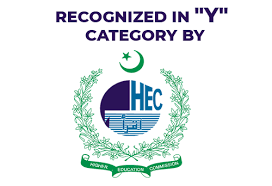Predictive Role of Mindfulness and Emotion Regulation for Psychological Distress in Pakistani Medical Students
Abstract
 Abstract Views: 153
Abstract Views: 153
This research was intended to investigate the relationship between mindfulness, emotion regulation, and psychological distress in Pakistani medical students. It was also aimed to assess the predictive role of mindfulness and emotion regulation for psychological distress (depression, anxiety, stress). Correlational research design and purposive sampling techniques were used. The data was collected from both public and private medical colleges. The total sample comprised 216 participants (men; n=96; women; n= 120). Mindful Attention Awareness Scale, Emotion Regulation Questionnaire, Depression, Anxiety, and Stress Scale (DASS-21) along with a demographic information sheet were used to assess the study variables. Results were analyzed through SPSS 21. Findings revealed a significant negative relationship of mindfulness and emotion regulation with psychological distress (depression, anxiety, and stress) in medical students. Furthermore, mindfulness and emotion regulation significantly predicted psychological distress (anxiety). The results of the present study will help clinical psychologists to devise improved training programs and therapeutic interventions for medical students for minimizing their distress so that medical students become able to perform better in their academic activities.
Downloads
References
Baer, R. A. (2003). Mindfulness training as a clinical intervention: A conceptual and empirical review. Clinical Psychology: Science and Practice, 10(2), 125-143. https://doi.org/10.1093/clipsy.bpg015
Bohlmeijer, E., Prenger, R., Taal, E., & Cuijpers, P. (2010). The effects of mindfulness-based stress reduction therapy on mental health of adults with a chronic medical disease: A meta-analysis. Journal of Psychosomatic Research, 68(6), 539-544. https://doi.org/10.1016/j.jpsychores.2009.10.005
Brown, K. W., & Ryan, R. M. (2003). The benefits of being present: mindfulness and its role in psychological well-being. Journal of Personality and Social Psychology, 84(4), 822-848. https://doi.org/10.1037/0022-3514.84.4.822
Coffey, K. A., Hartman, M., & Fredrickson, B. L. (2010). Deconstructing mindfulness and constructing mental health: Understanding mindfulness and its mechanisms of action. Mindfulness, 1, 235-253. https://doi.org/10.1007/s12671-010-0033-2
Erisman, S., & Roemer, L. (2010). A preliminary Investigation of the effects of experimentally induced mindfulness on emotion responding to film clips. Emotion, 10 (1), 72-82. https://doi.org/10.1037/a0017162
Esmaeilinasab, M., Andami, K. A., & Makhmali, A. (2016). Emotion regulation and life satisfaction in university students: Gender Differences, 798-809. https://doi.org/10.15405/epsbs.2016.11.82
Falkenström, F. (2010). Studying mindfulness in experienced meditators: a quasi-experimental approach. Personality and Individual Differences, 48, 305-310.
http://dx.doi.org/10.1016/j.paid.2009.10.022
Gross, J. J. (1999). Emotion regulation: Past, present, future. Cognition and Emotion, 13(5), 551-573. https://doi.org/10.1080/026999399379186
Gross, J. J. (Ed.). (2013). Handbook of emotion regulation. Guilford publications.
Guendelman, S., Medeiros, S., & Rampes, H. (2017). Mindfulness and emotion regulation: Insights from neurobiological, psychological, and clinical studies. Frontiers in Psychology, 8, 220. https://doi.org/10.3389/fpsyg.2017.00220
Hill, M. R., Goicochea, S., & Merlo, L. J. (2018). In their own words: Stressors facing medical students in the millennial generation. Medical Education Online, 23(1), e1530558. https://doi.org/10.1080/10872981.2018.1530558
Iani, L., Lauriola, M., Chiesa, A., & Cafaro, V. (2019). Associations between mindfulness and emotion regulation: The key role of describing and nonreactivity. Mindfulness, 10(2), 366-375.
Jacob, J., Jovic, E., & Brinkerhoff, M. (2004). Mindfulness, Spirituality and Subjective Well-Being: A survey of ecological sustainability movement participants [Paper presentation]. Sixth International Society of Quality of Life Studies (ISQOLS) Conference.
Keng, S. L., Smoski, M. J., & Robins, C. J. (2011). Effects of mindfulness on psychological health: a review of empirical studies. Clinical Psychology Review, 31(6), 1041-1056. https://doi.org/10.1016/j.cpr.2011.04.006
Lovibond, P. F., & Lovibond, S. H. (1995). The structure of negative emotional states: comparison of the Depression Anxiety Stress Scales (DASS) with the Beck Depression and Anxiety Inventories. Behaviour Research and Therapy, 33(3), 335-343. https://doi.org/10.1016/0005-7967(94)00075-u
Ma, Y., & Fang, S. (2019). Adolescents' mindfulness and psychological distress: The mediating role of emotion regulation. Frontiers in psychology, 10, e1358. https://doi.org/10.3389/fpsyg.2019.01358
Marlatt, G. A. (2002). Buddhist philosophy and the treatment of addictive behavior. Cognitive and Behavioral Practice, 9, 44-50. https://doi.org/10.1016/S1077-7229(02)80039-6
Mirza, A. A., Baig, M., Beyari, G. M., Halawani, M. A., & Mirza, A. A. (2021). Depression and anxiety among medical students: A brief overview. Advances in Medical Education and Practice, 12, 393–398. https://doi.org/10.2147/AMEP.S302897
Qasim, N., Rana, H., & Ashraf, R. (2022). Mindfulness and Psychological Distress in Medical Students: Mediating Role of Emotion Regulation. Pakistan Journal of Medical and Health Sciences, 16(7), 568–571. https://doi.org/10.53350/pjmhs22167568
Parto, M. (2010). Mindfulness, resilience and drug use among at risk adolescents: Assessing the explanatory model of mediating variables and mechanisms [Ph.D. thesis]. University of Tehran.
Rehman, R., Zafar, A., Mohib, A., Hussain, M., & Ali, R. (2018). Self-reported academic performance in relation to health behaviours among Bahria University students. JPMA. The Journal of the Pakistan Medical Association, 68(2), 195–199.
Saeed, F., & Rana, H. (2019). Emotional Regulation, Conflict Regulation and Quality of Life in Doctors (Unpublished master thesis). University of Lahore, Pakistan.
Schutte, N. S., & Malouff, J. M. (2011). Emotional intelligence mediates the relationship between mindfulness and subjective well-being. Personality and Individual Differences, 50(7), 1116-1119. https://doi.org/10.1016/j.paid.2011.01.037
Slonim, J., Kienhuis, M., Di Benedetto, M., & Reece, J. (2015). The relationships among self-care, dispositional mindfulness, and psychological distress in medical students. Medical Education Online, 20(1), e27924. https://doi.org/10.3402/meo.v20.27924
Teasdale, J. D., Segal, Z. V., & Williams. M. G. (2003). Mindfulness training and problem formulation. Clinical Psychology: Science and Practice, 10(2), 157-160. https://doi.org/10.1093/clipsy.bpg017








